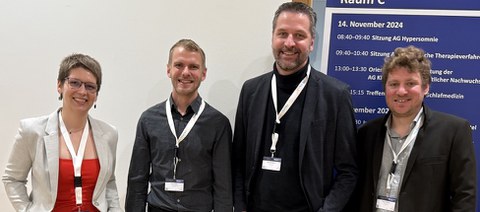14.03.2025
Welt-Schlaf-Tag – World Sleep Day

Das Somnolink-Team aus Dresden auf der Jahrestagung der Deutschen Gesellschaft für Schlafforschung und Schlafmedizin: Dr.-Ing. Miriam Goldammer, Dr. Tony Sehr, PD Dr. Moritz Brandt, Franz Ehrlich (v. links n. rechts)
Heute am 14.03.2025 ist Welt-Schlaf-Tag – World Sleep Day.
Eine gute Erinnerung, wie wichtig gesunder und ausreichender Schlaf für unsere Gesundheit ist!
Auch innerhalb der Hochschulmedizin Dresden und damit bei uns am Zentrum für Medizinische Informatik (ZMI) wird der Schlafmedizin ein besonderer Stellenwert zugeordnet:
Seit einem Jahr läuft „Somnolink“, ein nationales Verbundprojekt der Medizininformatik-Initiative (MII), in dem Dresden mit Wissenschaftler:innen aus dem ZMI und dem Neurologischen Schlaflabor stark vertreten ist:
Prof. Dr. Martin Sedlmayr, Dr.-Ing. Miriam Goldammer, unsere Leiterin des Forschungsbereichs Data Science, und Franz Ehrlich vom ZMI bilden gemeinsam mit dem wissenschaftlichen und dem ärztlichen Leiter des Schlaflabors, PD Dr. Moritz Brandt und Dr. Tony Sehr, das Dresdner Somnolink-Team.
Somnolink zielt darauf ab, die Diagnose, Behandlung und Therapietreue bei obstruktiver Schlafapnoe (OSA) durch den Einsatz von Medizininformatik und Datenwissenschaften zu verbessern.
OSA betrifft ca. 26 Millionen Menschen in Deutschland und erhöht das Risiko für Herz-Kreislauferkrankungen erheblich.
In Somnolink arbeiten Schlafmediziner:innen und Medizininformatiker:innen aus ganz Deutschland Hand in Hand, um mithilfe von Künstlicher Intelligenz und hochwertigen Gesundheitsdaten die Diagnostik und Therapie von OSA zu verbessern. Neun interdisziplinäre Standorte, einschließlich Big Data- und Ethik-Expert:innen, sind beteiligt.
Hierbei liegt der Fokus auf fünf Bereichen:
✔ Früherkennung
✔ Patient:innen-Zentrierung und -Forschungsengagement
✔ Öffentliches Bewusstsein und Gesundheitswirkung
✔ Verfügbarkeit von Schlafdaten für bessere Versorgung und Forschung
✔ FAIRness und Nachhaltigkeit von Dateninfrastrukturen
Interoperabilität ist hierbei sowohl für die Optimierung des Diagnose- und Behandlungspfads als auch für das Training von KI-Verfahren Voraussetzung. Deshalb beschäftigt sich das Somnolink-Team insbesondere mit der Harmonisierung der schlafmedizinischen Daten.
KI spielt eine entscheidende Rolle, insbesondere um OSA bei Frauen besser zu erkennen und die Therapie zu unterstützen. Ein Kerndatensatz und Methoden für nächtliche Schlafmessungen wurden bereits entwickelt.
Das Dresdner Team unter der Leitung von Prof. Dr. Sedlmayr und PD Dr. med. Brandt bringt sich stark in das Projekt Somnolink ein und leitet die beiden Arbeitspakete "Open Science, Cybersicherheit und technische Konvergenz" und "Frühzeitige Identifizierung von Patient:innen im stationären Kontext". Erste Arbeiten im Rahmen des Projektes konnten bereits veröffentlicht werden https://www.nature.com/articles/s41598-024-67022-9 .
Bisherige Ergebnisse wurden außerdem bei den Jahrestagungen der Deutschen Gesellschaft für Medizinische Informatik, Biometrie und Epidemiologie (GMDS) im September 2024 in Dresden, der Deutschen Gesellschaft für Schlafforschung und Schlafmedizin (DGSM), aber auch auf internationalem Parkett, bei der Sleep Europe im Herbst 2024 in Sevilla, präsentiert.
Für 2025 stehen insbesondere der Start der ersten Studien und der Aufbau des Somnolink-Hubs zum Austausch von schlafmedizinischen Daten an. Zudem gründet sich aktuell ein Team, das ein neues Erweiterungsmodul „Schlafmedizinischer Befund“ für den MII-Kerndatensatz entwickeln will.
Als nächster Arbeitsschwerpunkt ist die Entwicklung eines Modells zur Früherkennung von OSA anhand von Routinedaten aus der klinischen Versorgung vorgesehen. Dafür wird eng mit dem Dresdner Datenintegrationszentrum (DIZ) zusammengearbeitet, dass die Daten des UKD zentral erschließt und strukturiert, um sie für die Forschung besser nutzbar zu machen.
